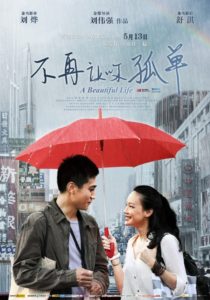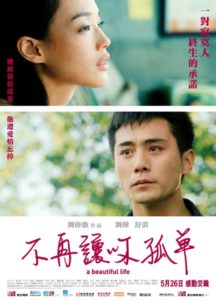A Beautiful Life
不再让你孤单
Hong Kong/China, 2011, colour, 2.35:1, 121 mins.
Director: Liu Weiqiang 刘伟强 [Andrew Lau].
Rating: 7/10.
Odd-couple romantic drama that’s uneven but still very engaging, with actress Shu Qi on top form.
Beijing, the present day. During a very drunken evening at a karaoke club, Li Peiru (Shu Qi) bumps into Fang Zhendong (Liu Ye) in the men’s toilet and ends up being escorted by him back to her flat. She is from Hong Kong, works as a real estate agent and has a married boyfriend called Andrew (Lian Kai); he is a policeman, divorced and sharing an oldstyle courtyard house with his younger brother Fang Zhencong (Tian Liang), who is a gifted portrait artist but also autistic. Fang Zhendong and Li Peiru subsequently bump into each other a couple of times, and a kind of friendship develops, with her often calling him when she’s drunk or having a problem. Li Peiru has  moved to Beijing (after previous spells in Taiwan and Shanghai) to find a rich boyfriend who’ll buy her a flat; but her dream is not going to plan. When her boss cheats her out of her commission of RMB100,000, she asks Fang Zhendong to investigate whether he has another woman – a job the highly principled Fang Zhendong grudgingly agrees to. Li Peiru ends up being sacked from her job and decides to start her own real estate business, for which she needs about RMB300,000. Fang Zhendong finally decides to loan her the money, but the business encounters problems and soon afterwards Fang Zhendong receives some news that affects his whole career. Then Li Peiru disappears.
moved to Beijing (after previous spells in Taiwan and Shanghai) to find a rich boyfriend who’ll buy her a flat; but her dream is not going to plan. When her boss cheats her out of her commission of RMB100,000, she asks Fang Zhendong to investigate whether he has another woman – a job the highly principled Fang Zhendong grudgingly agrees to. Li Peiru ends up being sacked from her job and decides to start her own real estate business, for which she needs about RMB300,000. Fang Zhendong finally decides to loan her the money, but the business encounters problems and soon afterwards Fang Zhendong receives some news that affects his whole career. Then Li Peiru disappears.
REVIEW
Taking its Chinese title (“I Will Never Leave You Alone Again”) from a very popular 1990s ballad by Taiwan songwriter Chen Sheng 陳昇, A Beautiful Life 不再让你孤单 starts as a routine meet-cute movie between a Hong Kong golddigger and a straight-arrowed Beijing policeman but develops into a long-limbed study of two complete opposites who can’t stop seeing each other. Hong Kong director Liu Weiqiang 刘伟强 [Andrew Lau] brought off a similar idea a decade ago with the San Francisco-set Sausalito 一见钟情 (2000), starring Li Ming 黎明 [Leon Lai] and Zhang Manyu 张曼玉 [Maggie Cheung] as an unlikely couple. Life has a less make-it-up-as-we-go, documentary-like look and flavour; but in Liu Ye 刘烨 and Shu Qi 舒淇 it has two even better leads (with real screen chemistry together) and a more structured script. The latter is by Hong Kong’s Deng Jieming 邓洁明 , who previously wrote Liu’s Cinderella-like rom-com Look for a Star 游龙戏凤 (2009), in which Shu Qi also starred (opposite Liu Dehua 刘德华 [Andy Lau]). Though Life is never much more than a predictable romantic drama with ambitions, Deng’s script provides enough material for the well-chosen cast to shine.
Like Zhang in Sausalito, Shu is the sine qua non of the whole movie, in a performance that swings from being way-over-the-top to among the best of her career. Including many of her extrovert trademarks, but also touching much more subtle areas, it’s a performance she couldn’t have done prior to the experience of working on If You Are the One 非诚勿扰 (2008) and If You Are the One II 非诚勿扰II (2010), and now in her mid-30s she has looks which are also developing some character. A remarkable drunk scene, shot as a 5½-minute single take in a Beijing back alley, and with the actress switching between Mandarin and Cantonese, sums up the extremes of her performance; others, like cutting Liu Ye’s hair one day or re-meeting him after a space of time, show the subtlety of which she’s now capable.
Liu plays a quieter second fiddle to her but in the film’s second half, as the two characters’ lives and personalities are reversed, the actor also gets his chances. His role of an upright, principled cop is a tougher one to bring off without seeming cliched, and the script is careful to give him time with the supporting cast (Huang Qiusheng 黄秋生 [Anthony Wong] as a blind bar-owner, Olympic diver Tian Liang 田亮 as his autistic brother, Gao Tian 高天 as his police partner) to develop the role away from the glare of Shu’s performance.
Despite its ups and downs, Life finally makes rewarding viewing, and manages to deliver some genuine emotion above and beyond the plot’s rote, disease-of-the-week elements. It’s in movies like this and Sausalito – rather than in his bigger-budget genre movies – that Liu Weiqiang comes closest to being a kind of Chinese Claude Lelouch, not only by being his own d.p. but also by attempting long-arced relationship stories with a personalised feel. The film’s last half-hour, set outside Beijing in the western district of Mentougou, provides a welcome contrast to the more familiar Beijing cityscapes.
On a cultural/historical note, it’s interesting how the film – made and written by died-in-the-wool Hong Kongers – goes out of its way in the dialogue to be negative about the city, portraying it as a lawless, unfriendly and laissez-faire place from the perspective of Beijingers. In that respect, Life catches the current Zeitgeist: for decades, Hong Kong was the Chinese epicentre and its movies made condescending jibes about Mainlanders; now it’s China where lives and fortunes are made, with Hong Kong reduced to a four-minute cameo in the movie.
CREDITS
Presented by Media Asia Films (HK), Beijing Bona Film & Cultural Communication (CN), China Film Media Asia Audio Video Distribution (CN). Produced by Basic Pictures (HK).
Script: Deng Jieming, Lv Guannan. Photography: Liu Weiqiang [Andrew Lau], Li Yaohui [Lai Yiu-fai]. Editing: Zhong Weizhao [Azrael Chung]. Music: Chen Guangrong [Comfort Chan]. Title song: Chen Sheng (1994). Art direction: Lin Ziqiao. Costume design: Wu Lilu [Dora Ng]. Sound: Lu Ke, Zeng Jingxiang [Kinson Tsang]. Visual effects: Huang Hongda.
Cast: Liu Ye (Fang Zhendong), Shu Qi (Li Peiru), Tian Liang (Fang Zhencong, Fang Zhendong’s younger brother), Huang Qiusheng [Anthony Wong] (Zhong, bar owner), Feng Danying (Xiaowan, Zhencong’s girlfriend), Sarina (Xiaowan’s mother), Zhang Songwen (Zhu Tian), Gao Tian (Shen Guiping, Fang Zhendong’s police partner), Lian Kai (Andrew), Wang Feng (Xiaole), Xia Yang (Ruby), Liu Tao (Ke), Zhang Hui (Zhu Tian’s wife).
Release: Hong Kong, 26 May 2011; China, 13 May 2011.
(Review originally published on Film Business Asia, 12 Aug 2011.)
